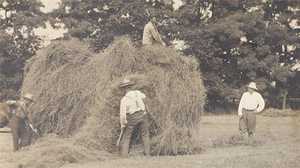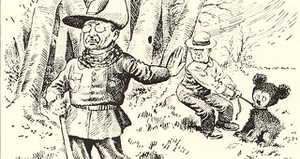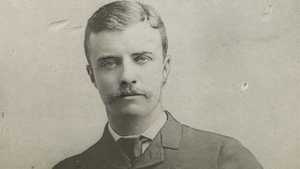TR's Legacy
Theodore Roosevelt was above all a man of action. During the time he was president, from 1901 to 1909, he altered American foreign and domestic policy — and even the presidency itself — in ways that would influence the nation for decades to come.

When Roosevelt assumed the presidency, business and political machines dominated the landscape, carving up territory, buying candidates, and manipulating legislation. The courts usually defended moneyed interests, and had little care for the needs of the common folk. The president wielded as much power as the machines allowed. TR vowed to empower the presidency, and empower it he did. After a brief period of appeasing conservatives, Roosevelt launched the first salvo of his war against the machines, filing an anti-trust action against J. P. Morgan's Northern Securities Company.
Shortly thereafter, the rambunctious Roosevelt intervened in a nationwide coal strike, threatening to use federal troops to operate the mines unless the strike was settled, and pushing the powers of the presidency to unprecedented -- and some said unconstitutional -- limits. TR made it clear that his interpretation of the Constitution allowed the president to wield broad powers in the face of national crises. "I am President of all the people of the United States," Roosevelt wrote, "without regard to creed, color, birthplace, occupation, or social condition. My aim is to do equal and exact justice among them all."
In seven years as president, he instituted numerous progressive reforms. The Hepburn Act gave the government power to set freight rates. The Bureau of Corporations took action against unscrupulous monopolies. The Pure Food and Drug Act and the Meat Inspection Act ushered in a new era of consumer protections. As an ex-president and Progressice Party candidate, Roosevelt lobbied for policies that would form the core of the future federal government -- old-age pensions, unemployment insurance, a graduated income tax, child labor laws, and women's suffrage.
With Roosevelt in the White House, the presidency became a position of popular celebrity. Battering aside years of colorless presidential politics, he blasted his way onto the national scene, an outspoken moral crusader who shot from the hip.
A man who believed in "the supreme triumph of war," Roosevelt advocated strength as the guarantor of peace. Under Roosevelt, the U.S. fused its economic might with military power and began its rise to international dominance. TR blocked European interference in the Western hemisphere and paternally subjugated Latin nations, citing America's duty to act against countries guilty of "wrongdoing." He supported the spurious revolution that gave the U.S. control of the Panama Canal Zone, and he built the Panama Canal, dramatically enhancing America's strategic position on the seas.
Roosevelt also understood the power of diplomacy. He brokered peace between Russia and Japan in 1906, stabilizing Asia, increasing America's international prestige, and winning the Nobel Prize. He arbitrated a Franco-German conflict over Morocco, possibly delaying the onset of World War I by a decade.

Perhaps Roosevelt's most enduring legacy is an expanded national conservation system. As business interests ravaged America's natural resources, Roosevelt moved to protect them with scientific management techniques. Using his executive powers, TR created scores of national monuments, refuges, and parks, including the Tongass forest reserve, Grand Canyon National Monument, and Muir Woods. All told, he placed over 230 million acres under federal protection.
During Theodore Roosevelt's political career, the United States evolved from a weak, domestically-oriented nation to a country with imperialistic aspirations, from a conservative nation to a more progressive one, from a nation bent on destroying its natural resources to one that had begun to preserve them. The office of the presidency changed as well, expanding its powers and becoming a popular obsession. The politics of Theodore Roosevelt shepherded America into the 20th century. Much of his legacy shepherded America out of that century as well.







